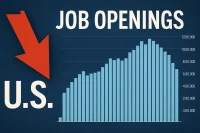The Department of Government Efficiency (DOGE), led by President Donald Trump and tech mogul Elon Musk, is slashing federal jobs at a pace that’s raising alarms across Washington.
While the layoffs are intended to streamline operations and cut costs, lawmakers and experts say they could cripple the government’s ability to attract skilled professionals — especially recent graduates and STEM talent.
Sen. Tim Kaine (D-Va.) described the fallout as “an enormous recruiting challenge.
He said:
“The recruiting challenge they’re creating for themselves is enormous.
“I don’t think that’s an accidental byproduct. I think that’s a known consequence — and they don’t care.”

Fallout for Students and New Grads
Federal hiring freezes and sudden agency cuts are already affecting students preparing to enter the workforce.
A Georgetown University senior told NBC News she was previously on track for a science role in government,.
However, she is now pivoting to consulting.
She said:
“I was really trying to avoid the private-sector track.
“Now, I don’t think the federal option is there anymore.”
This isn’t an isolated case.
Hiring freezes and cancelled pathways, like the Presidential Management Fellows Program — which Trump shut down via executive order in February — are closing off traditional entry points to public service careers.
A Chilling Effect on Long-Term Recruitment
Experts warn that these moves could discourage thousands of potential applicants.
Sen. Chris Van Hollen (D-Md.), whose state has a large federal workforce, pointed to comments from White House Budget Director Russ Vought, who previously said the goal was to make bureaucrats “traumatically affected.”
He said:
“They want civil servants to dread going to work.
“That’s not how you build a strong workforce.”
The message seems clear to many young professionals: the federal government is no longer a welcoming employer.
Why This Matters:
- The federal workforce includes more than 3 million jobs, most of which are non-political, career positions.
- Many roles are in critical fields like cybersecurity, climate science, public health, and infrastructure.
- Competing with tech salaries has always been tough — now, the mission-driven appeal is under threat, too.
The Employer Perspective: Lost Talent, Higher Costs
Even some Republicans are urging caution. Rep. Don Bacon (R-Neb.) criticized DOGE’s execution.
He said:
“It’s not efficient to fire someone and then rehire.
“Measure twice, cut once.”
His point underscores a deeper issue: rushed layoffs often lead to knowledge gaps, expensive re-training, and reduced operational efficiency.
For agencies and hiring managers, it’s a lose-lose scenario — budget cuts may be immediate, but the cost of replacing institutional knowledge is long-term.
Impact on STEM and AI Talent
The damage isn’t just at entry level. Former White House science adviser Arati Prabhakar warned that DOGE’s approach is alienating highly skilled candidates — the kind who could choose six-figure salaries in Silicon Valley but opt to serve the public instead.
She gave the example of a Stanford student with AI expertise, ready to take a federal job — but now unsure if her offer will hold.
“These actions are telling talented people to pound sand,” said Prabhakar.
What This Means for Job Seekers and Employers
For job seekers:
- Fewer federal roles may push graduates toward consulting, private tech, or corporate jobs.
- STEM professionals considering mission-driven careers might face hiring freezes or political instability.
- Internships and fellowships in government may no longer lead to full-time roles.
For employers:
- Private companies may see a surge in qualified applicants, especially from students now avoiding federal jobs.
- Recruitment messaging could benefit by emphasizing stability, mission-driven work, and long-term career growth — areas where government once held an edge.
A Generation in the Balance
The federal workforce has long been a place where top talent could contribute to the nation in meaningful ways — even without top-tier salaries.
But the current administration’s deep cuts, controversial rhetoric, and dismantling of recruitment programs risk dismantling that legacy.
If the trend continues, the US may face not just a short-term talent gap, but a generational loss of expertise in the public sector — one that could take decades to recover from.




